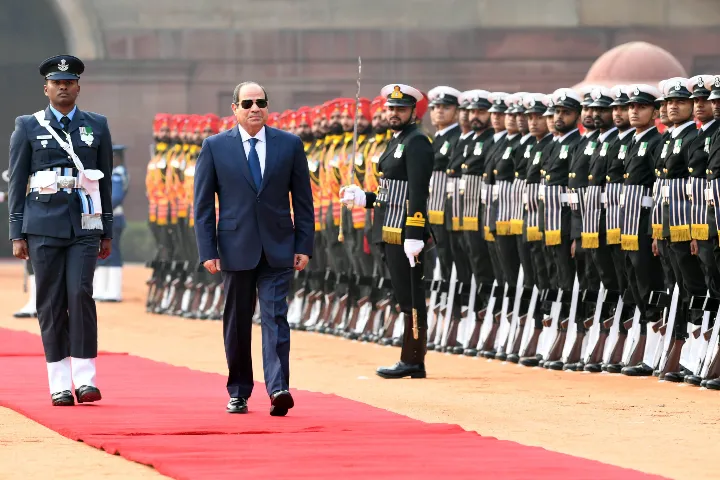A spate of recent developments indicate that India has been intensely engaging with Egypt. Egyptian President Abdel Fattah El-Sisi is the Chief Guest at the Republic Day parade this year. Prior to that, India’s External Affairs Minister S Jaishankar and Defence Minister Rajnath Singh had gone to Cairo. Last year, India and Egypt signed a defence cooperation agreement. The sale and setting up of production facility of India’s indigenously built Tejas fighter aircraft is on the cards as well.
Defence Minister Rajnath Singh, who is on a three-day visit to #Egypt met with its Defence Minister, General Mohamed Zaki on Tuesday in #Cairo and had wide-ranging discussions on numerous initiatives to further expand bilateral defence engagements between the two countries. pic.twitter.com/QMSCdGDUIo
— Koustuv

(@srdmk01) September 20, 2022
Recognizing the geostrategic importance of the North African country, India has invited Egypt as one of the guest countries for the G-20 summit this year. Last year, in the wake of the Russia-Ukraine War, India had exported 500,000 tonnes of wheat to Cairo. Egypt depends on imports for food security and India has the potential to emerge as one of the major food exporters to meet the Egyptian requirements. Defence exchanges between India and Egypt have also intensified in the recent past with the most notable being a visit by a large delegation of Egyptian Air Force officials to India. For many years, political momentum was missing from the Indo-Egyptian ties.
Egypt President El-Sisi's Delhi visit to bolster focus on Agriculture, Defence. Egypt has shown interest in LCA Tejas, radars, Akash missile system & DRDO's Smart Anti-Airfield Weapon. On Agri front India last yr allowed 61,000 tons of Wheat. Reporting:https://t.co/sg2KrxjcX9
— Sidhant Sibal (@sidhant) January 20, 2023
Why is India suddenly taking such an interest in Egypt? Changing global and regional security scenarios and India’s expanding strategic horizons explain the growing outreach to Egypt.
Egypt has always been an important country located at the crossroads of Africa, West Asia, and Europe. It is the third largest state in Africa by population and GDP. The strategic importance of Egypt has gone up considerably since the opening of the Suez Canal. When the cargo ship HMS Ever Given was struck in the Suez Canal last year, it sent shock waves across the global economy eco-system.
BREAKING:
The oil tanker Affinity V has run aground in the Suez Canal completely blocking all traffic.
It happened at almost the exactly same spot as when the containership Ever Given ran aground in 2021. pic.twitter.com/ISD2ClB4gP
— Visegrád 24 (@visegrad24) August 31, 2022
After the Russian invasion of Ukraine, countries like India and Egypt have been trying to perform a fine balancing act between the West and Russia. Strategic analysts in India, Egypt, and France have floated an idea of a trilateral engagement between the three countries. Close bilateral ties, complementary strategic interests, and geopolitical orientation provide further impetus to the trilateral cooperation format. This trilateral, if materialized, would build on other minilateral formats like the Indo-Pacific Quad (between India, Japan, US, and Australia) and India-France-UAE trilateral and would increase India’s foreign policy options.
India’s growing naval profile and widening arc of maritime activities bring the Red Sea, Eastern Mediterranean and the Suez Canal into the strategic matrix of the Indian Navy. India is an Associate Member of the US-led Combined Task Force-153 that focuses on maritime security in the Red Sea. Increasing military presence of major global powers in this region makes it imperative for India to monitor the region and mark its presence. The role of Egypt in facilitating India’s growing naval presence in the Red Sea and the Eastern Mediterranean will be critical.
India is looking to export its defence products. Smaller and medium-sized countries across the Indo-Pacific, Eurasia and Africa are potential customers. The Philippines has already purchased the BrahMos missiles whereas Armenia has bought missiles, rockets, and ammunition. These weapon exports are not just critical for building up the capabilities of the Indian defence industry but also underscore strategic choices made by India.
With the intensifying China challenge, arming the Philippines is a sound strategy whereas selling weapons to Armenia is a message to the Azerbaijan-Turkey-Pakistan alliance in the evolving geopolitics of the Caucasus. The sale of Tejas, if it goes through, to Egypt will be another significant milestone in India’s defence exports trajectory. It will open up African as well as West Asian markets for India’s defence products.
Also Watch: Under The Radar E1: India’s 250 Million USD Deal With Armenia & China’s Growing Rift With Pakistan
Egypt is one of India’s largest trading partners in Africa and the growing outreach to Egypt fits well into India’s expanding strategic ties with Africa as well. In the last few years, the Indian Navy had carried out naval visits and patrols in the Suez Canal as well as in the Gulf of Guinea. The fourth India-Africa Forum Summit is on the cards too.
India has historically trained military officers from Africa but has not been a major player in the African weapons market. Many African countries purchase weapons from the West, Russia, and China. India’s entry into this market will diversify defence partners for Africa as well as bring new opportunities for India’s defence manufacturers. The Russian preoccupation in Ukraine will open up possibilities for India to service and maintain Russian-made weapons, especially high-tech platforms like Su-30 aircraft, in Africa.
In this context, deepening strategic ties with Egypt has emerged as one of the important pillars of India’s policy towards West Asia and Africa. Maritime and military dimensions of India-Egypt relations offer the opportunities to build a win-win partnership.
Also Read: Why Egyptian President al-Sisi’s visit can expand India’s strategic horizons




















